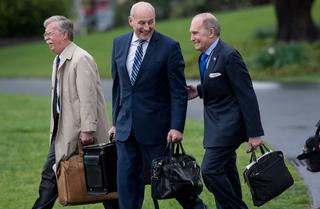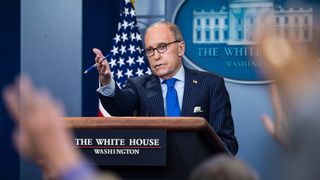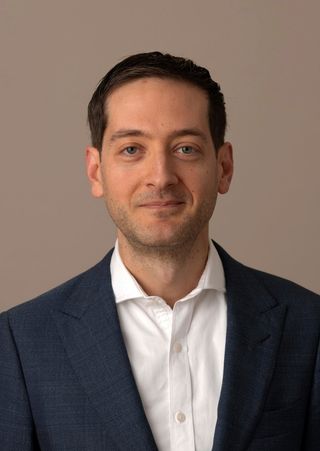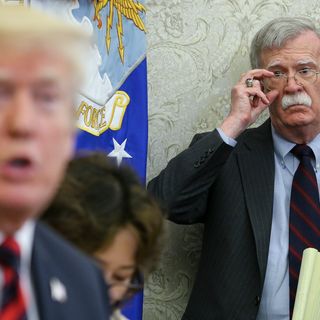President Trump has tweeted that Larry Kudlow, the director of the National Economic Council (NEC), has suffered a heart attack and is now at Walter Reed Medical Center in Washington, DC. The immediate decline of the US dollar following the president's tweet confirms that many trust Kudlow to support a free trade agenda and help avoid an escalatory trade war.
Some may have been surprised by Kudlow's aggressive attack on Canadian Prime Minister Justin Trudeau wherein he said that Trudeau "stabbed us in the back" while playing a "sophmoric political stunt". Ultimately, despite Kudlow's public support for free trade and sunny disposition, he and the president are more alike than some may realise. They lack traditional academic credentials and have had public falls from grace, but are charismatic media personalities who have had their own TV shows. They are champions of capitalism, partisan attack dogs, lovers of tax cuts, and not too concerned about budget deficits or policy minutia.
When President Trump selected Larry Kudlow as director of the NEC, the president decided that the most important economic role in the White House would be held by a man who is arguably more like him than almost any other member of the administration.
Appointed in early April 2018, Kudlow’s tenure began at a particularly fraught moment as the White House began rolling out its most contentious economic policy to date: the implementation of wide-ranging tariffs on foreign imports. Already a prominent voice in ongoing negotiations with China, many expect that any decrease of Kudlow's influence in a White House where free trade skeptics are ascendent only increases the likelihood of further tariffs and a trade war.
The man
After leaving Woodrow Wilson School master’s program at Princeton University, Larry Kudlow began his professional career as a junior economist at the New York Federal Reserve in the 1970s. By 1979, he joined investment bank Bear Stearns as chief economist, a position he would maintain for many years, excluding a two year secondment to the Reagan administration's Office of Management and Budget as an associate director in the office that administers the US federal budget. Kudlow resigned from Bear Stearns in 1994 amidst a well-known battle with drug addiction.
Soon thereafter Kudlow launched a successful media career, with regular columns, books, and television appearances, most notably as a personality on CNBC. His frequent media appearances – including early cheering for Trump’s candidacy, touting the president’s tax and deregulatory policies, and deriding Democrats for their “war on business” – undoubtedly helped a TV-preoccupied White House appoint Kudlow, a long-time friend of the president.
Kudlow is a traditional free trade-supporting supply-sider in that he believes that low taxes fuel economic growth. He is a protégé of one of the most well-known supply-side economists in the world, Arthur Laffer, best known for the theory (dubbed the “Laffer curve”) which posits that there is a trade-off between the tax rate and the amount of revenue raised, meaning taxes are revenue positive only to a point before becoming revenue negative. Kudlow has faced criticism for being more of a media personality than a practicing economist, yet he is still a man that Wall Street economists of various partisan backgrounds contend is a relatively stable voice on economic matters – especially when compared to other members of the Trump administration.
To many, the biggest relief surrounding Kudlow’s selection was who he was not – namely, President Trump’s protectionist trade advisor Peter Navarro. Unlike Navarro, Kudlow has not overemphasised trade imbalances – which many deem to be economically irrelevant – nor has he favoured blanket tariffs or held much of a nationalist American First streak.
Kudlow has been an ardent supporter and informal advisor for President Trump for some time. Prior to joining the White House, however, he explicitly criticised the president for the administration’s blanket steel and aluminium tariffs, saying that Trump was “so good on tax cuts. He's so good on deregulation, infrastructure… [But] he’s never been good on trade”. Kudlow later changed his outlook, arguing that the public should not overreact because the administration’s tariffs are merely part of a larger process and “at the end of this whole process, the end of the rainbow, there’s a pot of gold”.
The role
From the Council of Economic Advisors to the Secretary of Commerce and the Secretary of the Treasury, there are a number of economics-related cabinet positions, committees, and officials at the president’s disposal. The director of the NEC is unique as the chief economic advisor to the president, providing the lens through which a president understands economic issues and executes economic policy. Put differently, this post is the economic equivalent of the national security advisor. No single role is more influential in an administration’s formulation, execution and communication of economic policy.

It should be noted that the NEC is distinct from the Council of Economic Advisors. While the Council of Economic Advisors provides objective economic analysis and advice to the president, the National Economic Council is a significantly larger group of economic experts that includes agency and department heads to coordinate and help execute economic policy. The NEC has only existed since 1993, when President Bill Clinton created it by executive order after reasoning that the George H.W. Bush administration had successfully coordinated security policy but overlooked important economic issues.
Like the national security advisor, the NEC’s director is not subject to congressional approval. Kudlow inherited an office that has faced personnel turnover, like much of the Trump administration. But unlike other presidential advisors, Kudlow did not clean house upon his arrival, exclaiming “it’s a terrific staff, and I've asked everyone to stay on”.
Issues
Kudlow has been coordinating White House policy and communications on all economic issues, ranging from infrastructure to further regulation cutting. Trade policy, however, will likely define his agenda – likely putting him at odds with the president as the administration has widened its America First lens to international trade.
Kudlow’s predecessor, Gary Cohn, was also a free trader. While Cohn was an integral player in the Trump administration’s tax reforms in 2017, he frequently clashed with the president and his protectionist advisors, like Peter Navarro and US Trade Representative Robert Lighthizer. The protectionist wing’s success ultimately proved too much for Cohn, who resigned in March 2018 after Trump announced his intention of implementing steel and aluminium tariffs.
Reconciling Trump’s zero sum trade instincts with his own free trade principles has likely been Kudlow’s most daunting task. In addition to helping with the president’s infrastructure plan, government budgets, and possible further tax cuts, Kudlow has had to steward Trump through the upcoming challenges in regards to trade and tariff imposition. This required at trying to adhere to WTO rules while retaliating against China’s unfair trade practices, renegotiating NAFTA, and considering a post-TPP trade agenda for the Indo-Pacific.
Implications
Gary Cohn reportedly complained that he used only 20 per cent of his brain in his White House role because he was “leading Groundhog Day tutorials on the benefits of free trade and the danger of tariffs”. This is one of the many challenges Kudlow now faces.
To be successful, Kudlow has needed to continue where Cohn left off in defending the merits of a rules-based trading order within the White House. Abandoning America’s international engagements and responsibilities in regards to trade will only compound the opportunities for countries like China to engage in mercantilist policies in retaliation. Kudlow’s voice is a critical one of reason for such times.
The nice guy approach may endear Kudlow to the president, but critics have questioned whether his proximity to the president will come at the expense of Kudlow’s free trade principles.
Whereas Cohn was hard charging and more than willing to plainly tell the president he was wrong, Kudlow has, until recently at least, brought a “kill ’em with kindness approach” to the job. This broadly entails “spending time with Trump and on TV” to steer the “chaotic White House away from economic disaster by being the nicest guy in the West Wing”.
The nice guy approach may endear Kudlow to the president, but critics have questioned whether his proximity to the president has come at the expense of Kudlow’s free trade principles. Early in his tenure for example, he advocated a “trade coalition of the willing” – which sounded a lot like TPP and would likely have included Australia – to balance China’s trade heft, only to quickly retract his comments a few days later. Kudlow's comments criticising Trudeau's pledge to retaliate against US tariffs adds to the criticism.
Kudlow has so far used his charisma and communication skills (which his predecessor lacked) to internally bolster free trade arguments though its not clear if he has become the necessary repository of critical economic details – something that he has not shown a proclivity to in his media career. US allies like Australia, already under pressure to maintain relations with a relationship-driven White House, will likely be relied upon to maintain this knowledge and disseminate widely. If the White House is to lose one more voice for free trade, the pressure on allies like Australia is likely to only increase.







